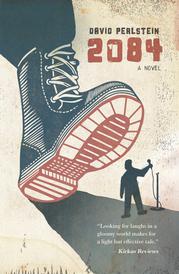PRO CONNECT

In this dystopian novel, a Jewish stand-up comic endures a humorless totalitarian government in a bleak mid-21st century America.
Sam Klein struggles as a stand-up comic in 2044 San Francisco. But life isn’t easy for most people in the Covenantal States of America—a Gilead-esque society. The country’s restrictive laws unquestionably favor White citizens, especially White, heterosexual, Christian males. Single women, for one, must pay a fine if not accompanied in public by a male family member. Sam belongs to a group of Jewish comics, the Minyan, who must abide by the Decency Act of ’37. As if that didn’t already limit their comedic range, a forthcoming amendment requires government officials’ approval of all comics’ routines. For Sam, the bad news keeps coming. The government threatens to relocate (read: deport) his wife, Indira, even though she’s an American citizen of Indian heritage. Sam can’t simply follow her to India; the law won’t let him leave the C.S.A. for three years. Meanwhile, some factions, in apparent defiance of the government, tag buildings; they spray-paint “2084,” an obvious, updated nod to George Orwell’s classic tale. Officials, it seems, suspect Sam is doing this since he tagged buildings as a teen. Complicating things further is Linda Morrison, a wanted fugitive and alleged terrorist whom Sam may have once dated. She contacts Sam and gives him a mysterious backpack. He adds this to his growing list of worries, from Indira’s possible deportation to the Minyanites’ looming amendment protest that’s sure to rile the government.
Perlstein’s story is often upbeat despite the somber environment. Sam and his fellow comics, for example, continually tell jokes on- and offstage. Sam’s stand-up generally bombs; he tends to perform onstage for a painfully quiet audience. His first-person narration, however, often kills. In one scene, his friends’ children thank Sam for gifts, singsong-ing “like members of a boys choir that doubled as a gang of ruthless, if well-disguised, assassins.” The author pairs this humor with themes of hope; Indira, despite her worrying circumstances, believes in “the possibility of things looking up.” In the same vein, Sam spends much of the narrative framing the setup of a joke, almost as if everything will be OK if he finds the right punchline. Still, the C.S.A. is an unnerving place. Government officials incessantly watch citizens à la Big Brother, ready to cite them for, say, hugging someone who isn’t a relative. Perlstein also knows how to throw a dramatic gut punch when readers won’t likely expect it. With regard to characters, the Minyanites boast comics of varying backgrounds. But the best is Sam’s pug, Winston, whose grunts and disapproving looks convey a nuanced cynicism.
Looking for laughs in a gloomy world makes for a light but effective tale.
Pub Date:
Page count: 263pp
Publisher: Manuscript
Review Posted Online: May 19, 2021
Kirkus Reviews Issue: July 1, 2021

In Perlstein’s novel, a bereft man, after the death of his wife of 46 years, examines his life with an aim of becoming “another version” of himself.
Steve Goldman has had an undeniably successful life in many ways. He’s a former officer at a San Francisco bank who’s found time to indulge his passion for fiction writing over the years; he knows he’ll never be as talented as Bernard Malamud or Philip Roth, but he’s content with that. Now he’s a retired widower who’s feeling his own mortality. One day, he sits down at the kitchen table and creates a life ledger of sorts, focusing mostly on his relationships with lifelong friends and thinking about when he’s been a “mensch” and when he’s been a “schmuck.” His greatest touchstones are three people he’s known since they attended junior high in Queens—Arnie Lieberman, Jeffrey Shiffrin, and Gary Weisbrod—all of whom he considers blood brothers. They’ve stayed in touch, or at least their paths have occasionally crossed, over the decades. Toward the very end of the novel, Steve offers an account of how the four took a train trip up the California coast for old times’ sake. The trip was instigated by Jeffrey, who was dying. They were all successful in their careers—Jeffrey, a lawyer; Gary, a wildly popular artist and genius self-promoter; and Arnie, an advertising agency art director-turned-painter. Arnie never forgave Steve for jilting his sister, Joyce, so many years ago; also, Steve feels that Jeffrey treated him and his wife, Evelyn, badly in the settling of her late father’s estate. All these people, and others, find their place in Steve’s ledger.
Perlstein, like his protagonist, lives in San Francisco and is a prolific and successful writer in his own right. That he writes well is hardly surprising. Steve's voice is delightful: self-regarding, conversational, honest, and witty (“I was determined to hold my ground rather than be shoveled into it”). Steve is a man who, whenever he lets himself off the hook, immediately realizes it and backtracks. Early on, he takes a walk in Golden Gate Park to clear his head and finds a split-open suitcase in the bushes; from this find, he concocts a wonderful (and sad) domestic story, establishing his writing credentials. He tells many other stories along the way, such as that of his flamboyant Uncle Max, who crossed the mob and had secrets. An account of Gary’s art installation, which has a comeuppance along the lines of “The Emperor’s New Clothes,” is priceless—and it also happens to dovetail with when Steve met Evelyn. Through it all, a tortured Steve issues dicta such as “I found myself powerless to keep self-justification from duking it out with guilt.” Steve eventually realizes that his ledger may not be the salvation he’d hoped for, since life is much too messy and accounting is for CPAs. But all this reflection, all this revisiting, certainly helps him get through a very tough couple of days.
An absorbing novel by a wise and graceful writer.
Pub Date:
Review Posted Online: April 14, 2024
Kirkus Reviews Issue: June 1, 2024

In this historical novel, Perlstein chronicles the rise of a transgender performer from Havana to Hollywood.
Anshel Sobel is born in Warsaw around 1910 and raised in New York City from the age of 2 under the American name Albert. In 1929, she fakes her own death, leaves her family behind, and heads for Havana under a new name: Lola Torres. She’s a talented pianist and singer, and she finds a place to stay with the sister of the Sobels’ housekeeper. Cuba seems like a land of opportunity for Lola, but it’s also a land of danger where her transgender status, Judaism, and Communist sympathies can lead to serious trouble. She’s soon performing in some of Havana’s hottest clubs under an even newer name: Lola Flores. She can’t keep her past completely hidden, however; an empathetic costumer, Fernando Fallon, who’s also transgender, tells her upon their first meeting, “You are not the first woman I have met who was born what seemed a man. Or a man born a woman.” Fernando becomes Lola’s secret-keeper and adviser, and together they embark on an impressive career, finding stardom not just in nightclubs, but on the Broadway stage, on radio and records, and even in films. Her celebrity brings her into the orbit of mobsters such as Benjamin “Bugsy” Siegel and Meyer Lansky and to the attention of FBI Director J. Edgar Hoover. It turns out that America is Lola’s land of opportunity after all, especially now that she’s there on her own terms. But as Lola’s star rises, the fear that her secret will be revealed lingers in the background.
Perlstein’s prose rolls out like a reel of film, convincingly illuminating early-1930s Cuba, late ’30s New York, and ’40s Los Angeles. At one point, for instance, Lola gets support from some familiar folks following her performance in the Ziegfeld Follies: “A hand patted Lola’s behind as the final curtain descended. ‘You were aces, kid,’ said Bob Hope, who’d had a previous Broadway hit. In the wings, Fanny Brice gave Lola a knip, pinching the flesh of Lola’s left cheek between her thumb and index finger. ‘Oy! A Cuban me, only prettier!’ ” Over the course of the novel, the author manages to get plenty of mileage out of Lola’s nesting-doll identities and aliases, which she uses to achieve a variety of goals. It’s a somewhat lengthy novel at nearly 450 pages, and, at times, it feels as if Perlstein is simply moving Lola through history for little reason other than the joy of encountering real-life celebrities and various world events. The book ultimately—and unexpectedly—has more to say about the American Jewish experience than about the transgender one, which readers may find intriguing or disappointing depending on their interests. Overall, this is a work that’s not quite a picaresque but not entirely serious in tone, either, and the book gets by, much like its protagonist, on the sheer bravado of its vision.
An intriguing, if overlong, reimaging of old-time entertainment history.
Pub Date: March 30, 2022
Page count: 356pp
Review Posted Online: June 6, 2022
Kirkus Reviews Issue: July 15, 2022
© Copyright 2024 Kirkus Media LLC. All Rights Reserved.
Hey there, book lover.
We’re glad you found a book that interests you!
We can’t wait for you to join Kirkus!
It’s free and takes less than 10 seconds!
Already have an account? Log in.
OR
Trouble signing in? Retrieve credentials.
Welcome Back!
OR
Trouble signing in? Retrieve credentials.
Don’t fret. We’ll find you.

